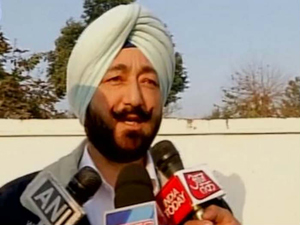Gurdaspur (Punjab), Jan 5: Punjab Superintendent of Police (SP) Salwinder Singh on Tuesday said his timely information ahead of the attack on the IAF base in Pathankot alerted security agencies and prevented a major terror strike.
 The SP had claimed he was abducted by five heavily armed men as he was returning after visiting a shrine on December 31 night. Senior police officers were allegedly wary of his claim on his abduction.
The SP had claimed he was abducted by five heavily armed men as he was returning after visiting a shrine on December 31 night. Senior police officers were allegedly wary of his claim on his abduction.
The SP said his sports utility vehicle was stopped and he and two others abducted around 11.30 pm on Thursday night (December 31). The attack at the Indian Air Force base took place around 3.30 a.m. on Saturday (January 2).
"My information was 1,000 percent true. There is no doubt about it. After I was dumped by my captors I freed myself and went to a nearby village Golpur Simbli. I told the villagers who I was. I then called up my superiors and gave them the information on my abduction.
"My information prevented a major (terror) incident. They could have done big damage had I not told about my abduction," Salwinder told the media here.
Salwinder Singh, who is under transfer from the border district of Gurdaspur, said he had informed his senior officers about his abduction by suspected terrorists soon after he was dumped.
"As I told senior officers, they reached Pathankot. The police were alerted because of my information. I don't know why the delay (in responding to the abduction incident) took place," he said.
"Only I know what happened to me. I have got a new lease of life. The truth has come out. Only I and the God knows how I returned," Salwinder said.
As for his alleged links with smugglers in the border belt, especially the odd time he was moving in the area, the SP said: "If anyone can prove my links with smugglers, I am willing to give up my life."
The police officer said his abductors came back in his Mahindra XUV with a blue beacon, to look for him and his cook Madan Gopal after both were dumped near a drain in a forest area.
"I had gone to offer prayers at the shrine near Kathua. While returning, we were stopped near Kolia turn. We thought it was a police barricade. Four-five people barged into our vehicle and carjacked my SUV. They put off the lights. My friend Rajesh Verma was driving. We later came to know that they were terrorists," Salwinder said.
"I could not resist as they were heavily armed. They threatened to shoot us. We were blindfolded, gagged and tied. We could not react. I did not take my gunmen since I was going to a shrine," the police officer said.
"They had AK-47s (assault rifles) and carried heavy bags. They spoke in Urdu, Punjabi, Hindi. They snatched my mobile phone and also took away Verma's phone. They were talking to their commander," he added.
Salwinder Singh said that when his gunman called on his mobile phone and asked for 'SP saab', they (terrorists) said 'Salaam Vallekum' and disconnected. They attacked Verma, slit his throat and left him for dead.
The police officer said they did not ask for directions as they had global positioning system and were talking about it.





Comments
i think this is inside JOB by Govt..........to divert peoples mind from current issues like black money
Add new comment